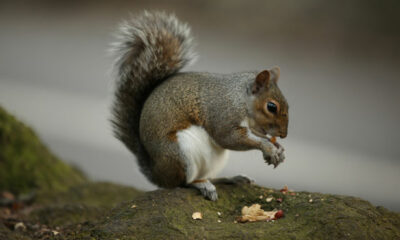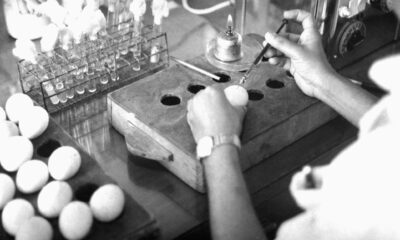Education
Censorship extending to Twitter likes?
A “news” reporter/editorialist called for censorship on the basis of Twitter likes – and amazingly, a university followed her suggestion.
A weekend article in The Philadelphia Inquirer provoked outrage among Twitter Files journalists and even from Twitter’s new owner. The subject: whether a university president should keep his job after liking the wrong tweets. Bad enough that a newspaper with such a long history would publish a screed about seemingly minor habits and actually call it news. Worse is what the university did about it, and what that means for free inquiry and why universities exist.
A Twitter likes censorship story?
The story comes from Susan Snyder of The Philadelphia Inquirer, datelined Saturday, April 29, at 5:00 a.m. EDT. According to it, Mark Tycocinski, President of Thomas Jefferson University and Dean of its Sidney Kimmel Medical College, “liked” several tweets that Ms. Snyder did not like. One of them, she didn’t even want to embed. In it, Donald J. Trump Jr. takes up the cause of Chloe Cole, suffering “transitioner’s remorse,” suing the doctors who persuaded her to opt for surgical mutilation and hormonal poisoning:
See also this tweet in reply to it:
Ms. Snyder also objected to these “likes” by Dr. Tycocinski:
Concerning the above, Snyder cited a hit piece in The Atlantic calling Alex Berenson “the pandemic’s wrongest man.”
Actually, several university employees “ratted him out” to Snyder. Said one:
He’s welcome to his private views. But broadcasting them on social media in his capacity as president of Jefferson shows questionable judgment and undermines Jefferson’s credibility as an institution of higher learning. Some of the views he endorses on his account call into question the university’s commitment to diversity and inclusion and would be hurtful to Jefferson’s trans-identifying students and students of color.
That alone is a red flag. A university ought to commit itself to objective truth, free inquiry, and debate. Nothing in that Wall Street Journal piece suggested denying admission to “students of color” by reason of their skin color. As to “trans-identifying” students, more on that below.
What happened next
Dr. Tycocinski actually felt the need to apologize, according to this follow-up piece. Perhaps to bring about that outcome, Snyder shopped her story to several professors at the University of Pennsylvania. She also trotted out several talking points, mainly about SARS-CoV-2 and its vaccines. But she might have missed the latest changes of recommendation from the Centers for Disease Control and Prevention. Evidently they don’t recommend more than one shot anymore. Also, the White House has eliminated the vaccine mandate for travelers.
Paul D. Thacker signaled the first outrage at this new censorship at 9:34 a.m. EDT yesterday.
Reaction to that included this image of a study contradicting Snyder’s assumption of near-universal acclaim for the vaccines:
Matt Orfalea, famous for his exposé of Project Osprey, offered this pithy observation:
Jay Bhattacharya, who has run afoul of censorship himself for contrary opinions about SARS-CoV-2, found the exercise absurd.
That’s when Elon Musk himself weighed in:
Alex Berenson himself took note:
Two hours later, after reflecting on Susan Snyder’s criticism of his December 2022 statement, demanded that she prove him wrong.
Then Mr. Berenson took note of this tweet by Elon Musk, from earlier this year.
Evidently that was another tweet that Mark Tycocinski liked.
Analysis
This story of censorship for Twitter likes illustrates everything wrong with the scientific and university communities today. We see disgruntled university staff getting back at a president who expressed a liking for positions they don’t like. And because they express their dislike to the right people, they get away with what could be a personal vendetta. We don’t even reliably know whether they know how anyone feels about Dr. Tycocinski’s positions, other than themselves. How many “students of color” or “trans-identifying students” did they themselves interview? CNAV has no way of knowing, but will venture to guess the answer: zero.
And if that number is non-zero, that raises another question: why should such people feel hurt? Lay aside whether talking about “hurt feelings” to someone other than the president, instead of asking for appointments to see him in person, is a Done Thing by a Mature Adult. Why should a case of “transitioner’s remorse” affect any of them? Do they, then, regard Chloe Cole as a traitor to their cause -= and if so, what is their cause?And does a mature adult really worry about “micro-aggressions”? (That, of course, begs the question of whether someone has really become an adult at the age of 18. Time was when the age of majority – adulthood – was 21.)
History of censorship in and of science and medicine
Worse yet is what some of these other professors are saying. Why be sensitive to a questioning of a particular principle of biological or clinical science? Could it be that these other professors know they are defending unsound principles and cannot abide any questioning of them?
Sadly, the history of science and medicine is replete with example after example of censorship to defend wrongheaded principles. William Harvey fought such censorship for years before he could demonstrate circulation of blood. Ignaz Semmelweiss’ relatives and associates committed him to a lunatic asylum, where guards beat him, causing septic shock that killed him. He had suggested that obstetricians wash their hands before attending birth. Years later, Louis Pasteur vindicated him, and handwashing today is more than ritual. Not only is it an essential element of aseptic technique, but it is also key to controlling easily transmissible diseases.
And now we see such censorship persisting – and a fine old newspaper publishing an article championing it. Elon Musk threw shade on Thomas Jefferson University, and was right to do so. But we should also throw shade on The Philadelphia Inquirer, and any other organ that upholds practices of this kind.
Terry A. Hurlbut has been a student of politics, philosophy, and science for more than 35 years. He is a graduate of Yale College and has served as a physician-level laboratory administrator in a 250-bed community hospital. He also is a serious student of the Bible, is conversant in its two primary original languages, and has followed the creation-science movement closely since 1993.
-

 Civilization4 days ago
Civilization4 days agoWhy Europe Shouldn’t Be Upset at Trump’s Venezuelan Actions
-

 Executive5 days ago
Executive5 days agoHow Relaxed COVID-Era Rules Fueled Minnesota’s Biggest Scam
-

 Christianity Today4 days ago
Christianity Today4 days agoSurprising Revival: Gen Z Men & Highly Educated Lead Return to Religion
-

 Civilization5 days ago
Civilization5 days agoThe End of Purple States and Competitive Districts
-

 Executive4 days ago
Executive4 days agoWaste of the Day: Can You Hear Me Now?
-

 Civilization1 day ago
Civilization1 day agoTariffs, the Supreme Court, and the Andrew Jackson Gambit
-

 Civilization2 days ago
Civilization2 days agoWhy Europe’s Institutional Status Quo is Now a Security Risk
-

 Civilization3 days ago
Civilization3 days agoDeporting Censorship: US Targets UK Government Ally Over Free Speech












